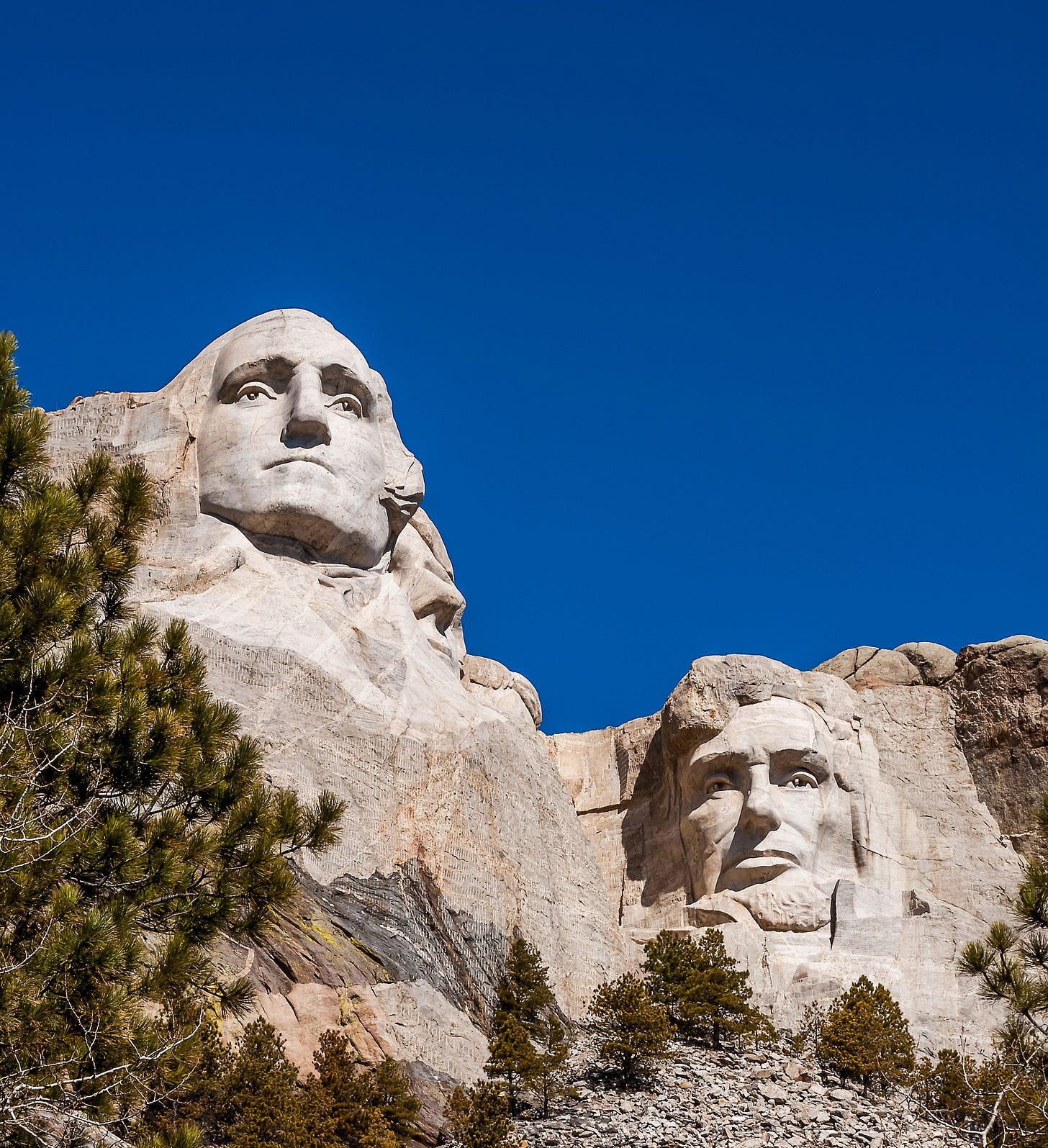Some Presidents Deserve to be Honored
Without Washington and Lincoln, there arguably would have been no America to reform, strengthen, transform, and modernize
I’m old enough to remember when we had Lincoln’s Birthday and Washington’s Birthday as separate holidays. They were combined into the bland “Presidents’ Day” in 1971. It was an unfortunate choice—not merely because we lost a day off from school and work. The average person today may not even know which presidents we are celebrating; and indeed, I suspect some presidents (especially the current one—Donald Trump, not Elon Musk) have enjoyed the ambiguity, attempting to bask in the reflected glow of our two towering American presidents.
Aside from wanting Americans to learn something about these presidents in particular, each unique in their respective eras, I find this the perfect opportunity to recall that not all presidents are cut from the same cloth.
George Washington might be best remembered for what power he did not exercise. After two terms, Washington could have run for a third. He chose not to, a norm that lasted until FDR. Washington also initiated the tradition of a farewell address, making clear that the office belongs to no single occupant. From planning the new capital, to assembling the heads of departments as a “cabinet,” to overseeing the ratification of the Bill of Rights, to calling up state militia, to suppress the Whiskey Rebellion (and then exercising the pardon power for those who participated in it), to appointing the entire slate of our first Supreme Court, to keeping America out of European Wars, Washington steered the fragile republic through its unsteady first years. In matters small and large, he set the pattern for those who followed.
Washington was the antithesis of the current Oval Office occupant. His restraint in the exercising of power, his reputation for honesty, his abhorrence of partisanship, and his insistence on the peaceful transfer of power—for many Americans—make him the model president.
But like so many, I find Lincoln—brooding, conflicted, grieving, intensely human—endlessly fascinating. He skillfully navigated among his cabinet members (keeping them in the fold, adjudicating clashes, winning their loyalty). He endured a series of weak generals until he found and backed Ulysses S. Grant, who would push us to victory. Lincoln was devoted not only to the Union in the abstract but to the essence of democracy (“of, by and for the people”), delivering one of the greatest pieces of political oratory and re-grounding America in the creed set forth by the Declaration (“All men…”).
Lincoln came to understand that the war to preserve the Union would necessitate the freeing of slaves, although he was no advocate of racial equality. He modeled magnanimity and reconciliation in the face of America’s bloodiest war, in which some 800,000 died and many more were permanently wounded. His martyrdom at the hands of a crazed confederate has lifted him to the status of near deity in the minds of many Americans.
In addition to passage of the 13th Amendment, Lincoln, even in wartime, produced landmark legislation. The Homestead Act, the Legal Tender Act (greenbacks!), the creation of the nation’s first real banking system (in large part to sell war bonds), and the Morrill Land Grant Act helped transform the American economy and put the federal government on the side of economic opportunity and upward mobility.
These two presidential giants have continued to dominate our political psyche, mostly for the better but sometimes inaptly. Washington’s heroic model in relinquishing power casts the current president, who stirred an insurrection against his own country, in a properly villainous light. By contrast, Washington’s wise counsel against foreign entanglements for an infant nation was subsequently invoked to justify isolation and abdication of moral authority for the world’s only superpower.
In a different vein, Lincoln’s devotion to the Declaration, however imperfectly understood, echoed down through the post-war amendments, to the Civil Rights era, to the battles for rights for women, LGBTQ+ Americans, and Americans with disabilities.
Certainly, other presidents made essential contributions to America. Thomas Jefferson doubled the size of the country; the Progressive Era presidents (Theodore Roosevelt, William Howard Taft, Woodrow Wilson) made the federal government an engine of reform; FDR kept us from economic meltdown and steered a wary nation out of isolationism to victory in war; and LBJ, while deceitfully immersing us in the Vietnam War, transformed America through Civil Rights and Great Society legislation. We can gratefully acknowledge the contributions of many others (Harry Truman for desegregating the Army, Dwight D. Eisenhower for the interstate highway system and leadership during the Cold War, Barack Obama’s Affordable Care Act, Joe Biden’s Infrastructure Bill.)
And yet, without Washington and Lincoln, there arguably would have been no America to reform, strengthen, transform, and modernize.
So, we come back to our Lincoln/Washington Birthdays. Perhaps, as Lincoln put it, their legacy will call on the better angels of our nature during a crisis in constitutional government when rampant lying and burgeoning corruption seem to have overtaken our government.
Here at The Contrarian, we will have an hour of live chat from 2-3 pm ET. We have plenty of other delights throughout the day, including interviews with historians Heather Cox Richardson and HW Brands as well as former national security adviser Susan Rice; a fascinating piece on First Ladies, another from historian Ted Whitmer, and some timely advice from the descendants of the New Dealers.
We cannot thank all of you enough for joining us on this venture to sustain democracy! We hope you enjoy spending part of your day with us.






Instead of putting Trump on Rushmore, which really is a lot of work, I suggest a crude sketch above a urinal in the gift-shop men's room.
Thanks for the history lesson! I learn so much from being here.